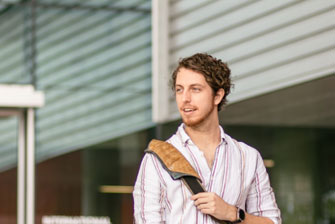
All fields marked with are required.
Why Griffith College?
A head start
Complete your Diploma of Engineering in just 8 or 12 months! Gain the knowledge required to succeed at university, and the practical skills to enable you to thrive in today’s workforce.
The ultimate support
You will be learning in a small, friendly environment with personalised support from your teachers and wellbeing support from your counsellors. It’s all designed to build your confidence ahead of university study.
Your pathway to university
Continue your studies by transitioning directly into the second year of an engineering degree at Griffith University, ranked in the top 2% of universities worldwide.
Your Pathway Options

Engineering (Honours)
The Bachelor of Engineering (Honours) is is your chance to have an impact on the way the world works. You could have the opportunity to make your mark on major global systems and infrastructure, or be at the forefront of localised urban projects. When you choose this degree, you will be engineering from day one. As a graduate, you will possess the hands-on skills that employers tell us they are seeking.

Engineering / Aviation
This double degree provides two clear career pathways. As a graduate, you may choose to be a qualified commercial pilot with engineering qualifications, knowing that airlines prefer their pilots to have an engineering qualification. Or, you could choose to be an engineer with flight qualifications, recognising that engineering companies building aircraft or aviation systems prefer flight-qualified engineers.

Software Engineering
From biotechnology to sports to submarines, if you want a hand in designing and implementing the software systems our society depends on, Griffith’s Bachelor of Software Engineering (Honours) is the ideal path for you. You’ll be engineering from day one, with a solid foundation in mathematics, computer systems, engineering principles and information systems.

Industrial Design
In this degree, you will learn the multifaceted practice of professional Industrial Design, from the blue-sky activities of idea-generation and invention to the rigorous knowledge of engineering science. You’ll learn through making as you get hands-on with advanced technologies, including 3D printing and other methods of cutting-edge manufacturing through to traditional craft/hand-making technologies and techniques.
